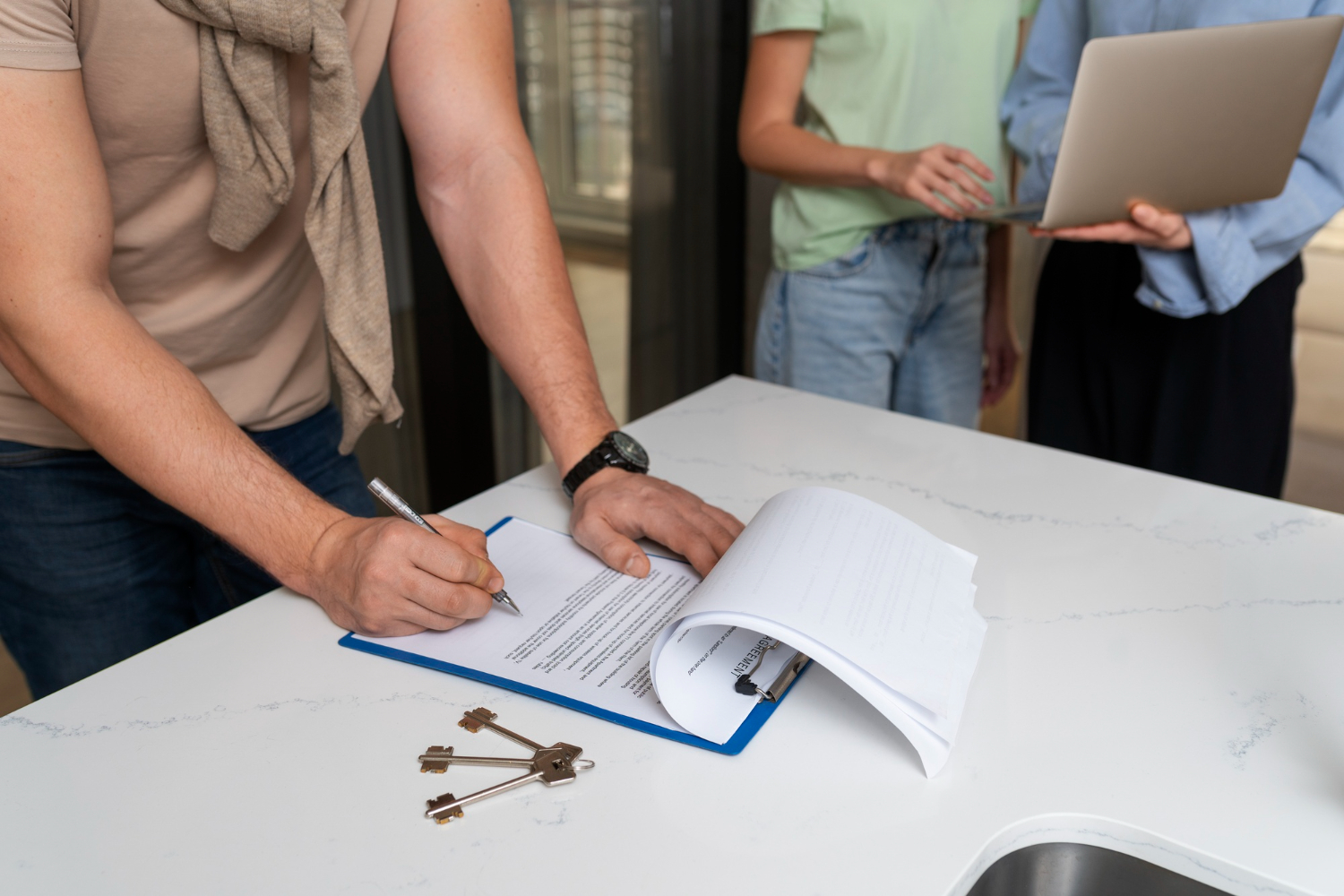Section 1: What is a “Dossier”?
Section 2: Documents a Tenant Needs to Provide
- As an employee
- A student
- As a representative of a company
- A craftsman/independent professional
- As an expat
- For retirees
What is a “Dossier”?
A “dossier” in France refers to a list of documents needed for official procedures such as applying for a mortgage or loan, purchasing or renting a property, or obtaining a visa or residence permit. Your dossier should contain all the required paperwork, such as proof of identity and address, evidence of income or taxable earnings, and so on.
When looking to rent a property in France, it’s standard practice to provide your dossier straight away. Many agencies won’t even consider showing properties to prospective tenants without reviewing your dossier. Therefore, it’s crucial to gather all the required documents before beginning your property search and have your dossier prepared.
Submitting an incomplete dossier often results in rejection, which can be disheartening, especially in competitive rental markets. So, when in doubt, it’s better to provide more than less. This will give you the best chance of securing your desired property.
This dossier is vital because it proves your financial stability to the owner. The French rental system is unique in that it is particularly protective of tenants; yet, there is a catch: for the property owner to commit to a prospective tenant before you sign the lease, there must be enough assurances.
Nonetheless, there are restrictions on the kinds of documents the landlord may ask you for. A landlord cannot ask you to provide some personal documents, including a bank statement or an excerpt of your criminal history. The exact requirements listed in the decree n°2015-1437 of November 5, 2015, are what can be expected of you.
Documents a tenant needs to provide
Nowadays, it is widely acceptable to present digital copies of your dossier. Therefore, it’s a good idea to organize a folder on your computer with all the documents saved (although you may still need to print out your dossier when signing the contract).
A comprehensive dossier for an apartment must include several documents. These can vary greatly depending on the individual circumstances.
Occasionally, a completed questionnaire is also required, along with proof of a French bank account, even though French law has prohibited asking for an R.I.B. since 2015.
As an employee
By far the most common case, it includes most of the elements that will be required in the other cases.
An identity document
The landlord may require only one valid ID among the following documents:
- French or foreign identity card (with photo)
- French or Foreigners passport (with photo)
- Foreigners or French driver’s license (with photo)
- Temporary residence permit
- Resident Card
-
Card of a national of a Member State of the EU: European Union or the EEA
Proof of residence
Only one of the following documents a landlord can request:
- The last three rent receipts
- A certificate from the previous landlord
- A certificate of election of domicile (proof of address for utility service)
-
The last property tax notice
A document proving your employment
Several documents may be requested. Among which:
- An employment contract
-
A certificate from the employer specifying the nature of the job, the salary, and the start date of the contract
A document certifying your resources
The landlord may require several documents, which may include:
- The last or second last tax notice
-
The last three pay slips
Sometimes, you might be asked for documents based on your specific circumstances. If you belong to any of these groups, it’s advisable to include them even if they weren’t requested at first.
As a student
If you are a student, you will not be asked for any professional documents. Yet, in addition to documents proving your identity and residence, documents related to your schooling will be requested. These may include:
- Carte d’étudiant – A student card or education certificate
- Certificat de scolarité – A school certificate
- An internship agreement
- A notice of award for students with scholarships.
As a representative of a company
The first two points do not change. However, you will be required to provide a certain number of documents, mainly if the tenant is not the signatory of the documents.
- An identity document of the signatory
- A Kbis dated less than three months
- A certificate from the employer
- The last tax return
- The power of signature (if the signatory is not on the Kbis)
As a craftsman/independent professional
Regarding the identity document and the proof of address, nothing new. Just consult the part about employees. For the rest, here is what will be helpful to the owner:
- The last two tax notices
- The Kbis or equivalent
- The last two balance sheets
- The professional card (liberal professions)
- The identification certificate from INSEE with the identification numbers (self-employed workers)
- The original D1 extract from the trade register dated less than three months ago (artisans)
- SIREN or SIRET certificate – proof of your business registration. A minimum of three years avis d’imposition (tax notices) showing stable and sustainable income (without this, business owners or self-employed workers may find it very difficult to rent in France)
As an expat
The first two points do not change. However, you will be required to provide:
- Your carte de séjour or residency card
For retirees
The first two points stay the same. Still, you must prepare:
- Proof of pension
- Your last three pension receipts
Additional Documents (if applicable)
Insurance Proof
Pet Information
- Documents related to pet ownership
-
Pet agreement form (if applicable)
Note: The tenant can give a copy of the documents. However, the landlord is entitled to request the submission of the original. Also, the papers should be in French or translated into French.
Sending in the dossier
It is possible to send the gathered documents by email. However, more secure transfers using SendInc or a similar provider like WeTransfer are also appropriate.
You may wonder about forwarding extremely sensitive information, like salary slips and identity documents, to total strangers. But then, this is a standard procedure in France.
So, how can you protect your dossier’s security?
“Dossier Facile” online platform
One common way to easily share your documents is to utilize the Dossier Facile website the French government provides. Here, you can upload all your paperwork for approval before starting your property hunt. The dossier is secured and will only be used for the apartment search.
The Guarantor
When an owner mentions garant exigé or caution exigée, you need a guarantor. Be careful, though, not to mistake it for the “dépôt de garantie” or the security deposit.
Anyway, it’s advisable to clarify with the landlord whether they are referring to a guarantor who will cover either unpaid rent or a security deposit for potential damages (but won’t necessarily cover unpaid rent).
The tenant might need to call upon a guarantor to cover any potential defaults if s/he lacks the funds to rent the unit independently (usually an income equivalent to three times the rent). This is why it is standard practice for a landlord to ask for a rental/damage deposit from a new tenant, which is refundable at the end of the tenancy.
Asking for a guarantor is a common request from landlords, who want the name of a French resident who can pay the rent if you cannot. Obviously, this isn’t easy if you’re new to the country.
A guarantor can be a family member, a friend, or any other person who would stand in for the tenant in the event of a rent loss.
Landlords frequently request a French guarantor for foreign tenants, but these can be hard to come by. Finding a rental in France is complicated when you do not have a CDI or Contrat à Durée Indéterminée (unlimited long-term employment contract) in France.
This is why many expats in France resort to using a guarantor. Guarantor companies are not free, but these services are often lifesavers for expats looking for a rental.
For example, retired foreigners with no CDI may have difficulty finding a French landlord accepting Social Security statements or extensive bank deposits.
Indeed, even if the income is high, the fact that it is from foreign sources does not reassure the owners (no recourse can be prohibited if you leave the territory).
To reassure the owner about your solvency, several solutions are available to you:
- Pay rent in advance (over several months or as a whole).
- Ask a loved one, family member, friend, or employer in France to be a guarantor.
- Call on a company (companies, banks, associations), an organization specializing in guarantors (guarantee organizations) as garantme.fr
The documents your guarantor will usually be asked for:
Regardless of this guarantor’s occupation, tax status, or place of residence, the required documents are precisely the same as those required from a tenant.
- French or foreign identity document
- Proof of address
- Employment contract
- The last three payslips or last three statements of pension payments
-
The last or penultimate tax statement
Is it necessary to have a guarantor when renting in France?
Although having a guarantor is not mandatory for renting in France, it might be required if your dossier is incomplete or less appealing, as well as for students and young individuals without a job contract.
Garantie Visale
Action Logement offers the Garantie Visale, a free rental deposit guarantee designed to help tenants secure a rental property more easily. It’s available to tenants entering private rental housing.
You’re eligible if you’re under 31 years old, regardless of your job situation (including students and those in vocational training). Individuals over 31 years old must be employed with a net salary of €1,500 or less, or they must be transitioning jobs, such as starting a new job or working on a short-term contract.
Visale guarantees your rent and charges, covering you in case you can’t pay. This makes your rental application stronger and helps reassure your landlord.
The guarantee covers all due rent and charges in case of payment issues, as well as any damages to the property, throughout the entire lease term, including renewals. Private rental housing covers up to 36 months of unpaid rent and charges, and social housing rented to students covers up to 9 months.
To give yourself every chance of success, check that you have all the documents you need for your application. This will ensure you have a complete file to give the landlord at the end of your apartment visit.
Let us take the stress out of finding your perfect home in France. Wunderflats has a curated selection of stylish, furnished apartments waiting for you. Browse our listings and contact us now to get started!
Please note: This article does not constitute legal advice – the information on this page has been prepared solely for your information. As we are not a law firm and act as a platform, we can and may share our estimations, but we cannot give you legal advice for your individual further proceedings.









